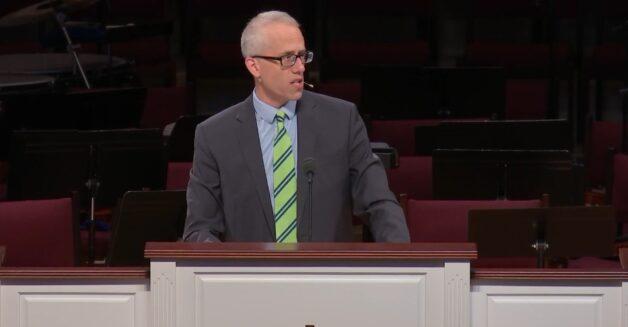
Following the Threads of Complicity
Is it a workable ethic, for anyone, to insist that every connection to human sinfulness, past or present, renders us culpable for that sin? Even if we could rid ourselves of every place and every institution tainted by slavery, for example, could we be sure that what remained was never built by people who exploited others and never financed by people who made their money through sinful enterprise? Do not all our favorite streaming services make money, at least in part, by the commodification of sex? Aren’t many of our movie studios, and some of our favorite sports leagues, complicit in aiding and abetting a government that disregards basic human rights? Are we sure about the purity of our mutual funds, or of the clothes and shoes that are manufactured overseas, or of the labor practices of the online retailers we use every day? And what of the products we enjoy (or the ones we don’t even know we are benefiting from) that may have ties to companies complicit in the past crimes and aggressions of other countries?
Christian obedience becomes impossible when, instead of the basics of putting off the works of the flesh and putting on the fruit of the Spirit (Gal. 5:16–24; Col. 3:5–14), we are called to account for every unpopular ism, every broken system, and every bad thing we see too much of in the culture.
Corporate Responsibility, but with Limits
This leads to a related question: What about the sins of the past? It’s one thing to say that we aren’t automatically guilty by virtue of living and working within a fallen system. We live in a globally connected world, and the lines of complicity are hard to trace out. But what about instances where the evils have been obvious and have been committed by people like us? Do we share some responsibility for the sins committed by those who were part of the same immediate family? What about the same religious family? Or what if the perpetrators in the past shared our same skin color? In short, how should we think of corporate responsibility?
Let me state my answer up front and then show how I reach that conclusion: the Bible has a category for corporate responsibility, but there are important limits to the use of this category.
The book of Acts is an illuminating case study in this respect. On the one hand, God may hold people responsible for sins they may not have directly carried out. In Acts 2, Peter charges the “men of Judea and all who dwell in Jerusalem” (Acts 2:14) with crucifying Jesus (Acts 2:23, 36). To be sure, they did this by the hands of lawless men (Acts 2:23). But as Jews present in Jerusalem during Passion Week, they bore some responsibility for Jesus’s death. Likewise, Peter charged the men of Israel gathered at Solomon’s Portico with delivering Jesus over and denying him in the presence of Pilate (Acts 3:11–16). While we don’t know if every single person in the Acts 3 crowd had chosen Barabbas over Christ, Peter certainly felt comfortable in laying the crucifixion at their feet. Most, if not all of them, had played an active role in the events leading up to Jesus’s death. This was a sin in need of repentance (Acts 3:19, 26). We see the same in Acts 4:10 and Acts 5:30 where Peter and John charged the council (i.e., the Sanhedrin) with killing Jesus. In short, the Jews in Jerusalem during Jesus’s last days bore responsibility for his murder.
Once the action leaves Jerusalem, however, the charges start to sound different. In speaking to Cornelius (a Gentile), his relatives, and his close friends, Peter relays that they (the Jews in Jerusalem) put Jesus to death (Acts 10:39). Even more specifically, Paul tells the crowd in Pisidian Antioch that “those who live in Jerusalem and their rulers” condemned Jesus (Acts 13:27). This speech is especially important because Paul is talking to Jews. He does not blame the Jews in Pisidian Antioch for the crimes of the Jews in Jerusalem.
This is a consistent pattern. Paul doesn’t charge the Jews in Thessalonica or Berea with killing Jesus (Acts 17), nor the Jews in Corinth (Acts 18) or in Ephesus (Acts 19). In fact, when Paul returns to Jerusalem years after the crucifixion, he does not accuse the Jews there of killing Jesus; he does not even charge the council with that crime (Acts 23). He doesn’t blame Felix (Acts 24) or Festus (Acts 25) or Agrippa (Acts 26) for Jesus’s death, even though they are all men in authority connected in some way with the governing apparatus that killed Christ. The apostles considered the Jews in Jerusalem at the time of the crucifixion uniquely responsible for Jesus’s death, but this culpability did not extend to every high-ranking official, to every Jew, or to everyone who would live in Jerusalem thereafter. The rest of the Jews and Gentiles in the book of Acts still had to repent of their wickedness, but they were not charged with killing the Messiah.
Does this mean there is never any place for corporate culpability across time and space? No. In Matthew 23:35, Jesus charges the scribes and Pharisees with murdering Zechariah the son of Barachiah. Although there is disagreement about who this Zechariah is, most scholars agree he is a figure from the past who was not killed in their lifetimes. The fact that the scribes and Pharisees were treating Jesus with contempt put them in the same category as their ancestors who had also treated God’s prophets with contempt (cf. Acts 7:51–53). It could rightly be said that they murdered Zechariah between the sanctuary and the altar because they shared in the same spirit of hate as the murderers in Zechariah’s day.
The Bible has a category for corporate responsibility, but there are important limits to the use of this category.
Similarly, there are several examples of corporate confession in the Old Testament. As God’s covenant people, the Israelites were commanded to confess their sins and turn from their wicked ways so as to come out from under the divinely sanctioned covenant curses (2 Chron. 6:12–42; 2 Chron. 7:13–18). This is why we see the likes of Ezra (Ezra 9–10), Nehemiah (Neh. 1:4–11), and Daniel (Dan. 9:3–19) leading in corporate confession. The Jews were not lumped together because of race, ethnicity, geography, education level, or socioeconomic status. The Israelites had freely entered into a covenant relationship with each other and with their God. In all three examples above, the leader entered into corporate confession because (1) he was praying for the covenant people, (2) the people were as a whole marked by unfaithfulness, and (3) the leader himself bore some responsibility for the actions of the people, either by having been blind to the sin (Ezra 9:3) or by participating directly in the sin (Neh. 1:6; Dan. 9:20). Culpability for sins committed can extend to a large group if virtually everyone in the group was active in the sin or if we bear the same spiritual resemblance to the perpetrators of the past.
It also bears mentioning that public apologies are more or less appropriate based on whether their cost is mainly to us or mainly to someone else. When someone steeped in Southern Presbyterianism apologizes in tears for the sins of the nineteenth-century Presbyterians he grew up revering, that costs something. When college kids who have never been tempted in their lives to idolize Richard the Lionheart set up confessional booths on campus to apologize for the Crusades, that costs next to nothing. One is a public expression of personal lament; the other is a personal expression of public virtue (of our own) and public accusation (of others).
Sour Grapes
Jeremiah 31:29–30 is an important text:
In those days they shall no longer say:
“‘The fathers have eaten sour grapes, and the children’s teeth are set on edge.’”
But everyone shall die for his own iniquity. Each man who eats sour grapes, his teeth shall be set on edge.
The proverb about eating sour grapes is also quoted in Ezekiel 18:2 and suggests that the people of Judah believed God was being unjust in punishing them for the sins of past generations (Ezek. 18:25). “Why should the children be punished for the sins of their fathers?” they asked. But Jeremiah and Ezekiel quote the proverb to reject it. The soul who sins shall die, not the soul of the one who does not sin (Ezek. 18:4–9).
Although Jeremiah and Ezekiel speak of the proverb being no more used in Israel, the reality of the proverb was never the way God dealt with his people. It is true that God had promised to visit “the iniquity of the fathers on the children to the third and the fourth generation of those who hate me” and to show “steadfast love to thousands of those who love me and keep my commandments” (Exod. 20:5–6). But do not miss the precise language of God’s promise. God says he will visit the iniquity of those who hate me and will show steadfast love to those who love me and keep my commandments. The promise was based on the children behaving like their parents, not simply on account of parental behavior irrespective of whether the children deviated from that pattern.
Long before Jeremiah and Ezekiel, it was already a principle in the Mosaic covenant that the corporate nature of the covenant did not consign children to the punishment of their fathers. “Fathers shall not be put to death because of their children, nor shall children be put to death because of their fathers. Each one shall be put to death for his own sin” (Deut. 24:16). It was never the case that children, regardless of how they lived, were to be punished for their father’s sins.
Living life in the present is hard enough without the impossible burden of owning the sins of the past as well. To be sure, our parents can give us huge advantages or disadvantages in life, and on a cosmic scale (known only to God) some of us enter this world with more privileges than others. We should also add that past sins can be recognized and renounced, even if we are not required specifically to repent of them. The sins of the past are far from irrelevant. And yet we are not meant to live with a sense of corporate guilt for an ethnic, racial, or biological identity we did not choose and from which we cannot be free. Self-flagellation is not a requirement for spiritual maturity. It is one thing for us to love God and love our neighbors; it is quite another if the call of Christian discipleship means we must, on account of the failures of others, hate ourselves.
This article is adapted from Impossible Christianity: Why Following Jesus Does Not Mean You Have to Change the World, Be an Expert in Everything, Accept Spiritual Failure, and Feel Miserable Pretty Much All the Time by Kevin DeYoung.



